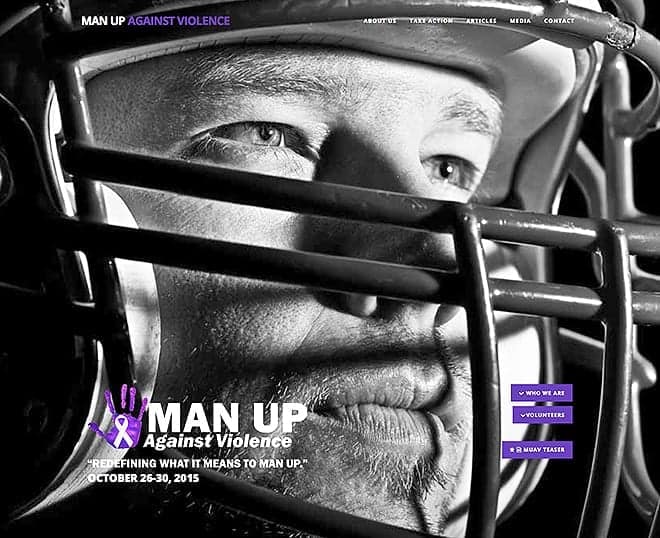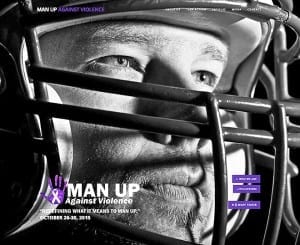Grassroots movement working against violence on campus

Interview with Roz Kelsey, driving force behind the ‘man up’ movement
Roz Kelsey is a faculty member in the Department of Kinesiology and Health Studies, as well as the founder of the “Man Up Against Violence” organization, which hosted several events for Violence Prevention Week at the University of Regina. She spoke to the Carillon from her office in the Kinesiology Building last Friday:
How did the Man Up Against Violence movement start?
RK: The movement started when the Executive Director of the Status of Women [Pat Faulconbridge] came to my door. She mentioned that she had funds to bring in a researcher by the name of Jackson Katz… he looks at gender construction in terms of masculinity. We sat down to talk about what that might look like, and we said, ‘you know what? That’s something we don’t talk about.’ We don’t talk about masculinity, and the construction of masculinity, and how it relates to the idea of violence. We usually look at it from a victim perspective, and prevention… we don’t really look at the perpetrators ever. We look at the environment, or the victim themselves.
And so, looking at how society constructs the expectations of masculinity – particularly unhealthy masculinity – was something that we hadn’t discussed very much. So when Pat came to talk to me about it, I said, “This is a bigger issue. We’ve got to do something about this. This is part of my studies, this critical theory and looking at gender construction.”
I don’t know many women who haven’t experienced violence from men, and that can come in a variety of forms. And I think we have to re-determine what violence means, too… Or men, when we talk about the construction of violence in terms of verbal abuse. How many guys have been called out for not performing masculinity the way they should?
And I said, “We need to talk about this more,” so we made it a series of events. I went to the President’s office, and she [Vianne Timmons] was right on board. She was ready to go with it, so we got funding from those two bodies.
How many members do you have?
That varies from term to term, but we have five or six executive positions… we have an advisory board that is made up of deans and campus security, and representation from the leadership team here at the University, and a student rep… then we have the operational team, which is the students who undertake a lot of the groundwork.
Can you think of any specific incidents that motivated the creation of your group?
I think that Ray Rice thing was really big. There seems to be a lot in the media, not only with domestic violence, coming from NFL teams, but also that whole incident with the Ottawa Gee-Gees, when Allan Rock had to disband the entire team. He saw a ton of backlash because of that… there was just so much of this going on that seemed to be this perpetual construction of unhealthy ways of demonstrating masculinity. So it was really about the objectification of others. Now, whether that was other men, other women, other children – whoever it was. This is where we get a lot of backlash, right? We get a lot of ‘oh, what about women who are abusive to men,’ and ‘what about other men,’ and ‘what about children’ and I always come back with the same idea – because we don’t cover every bit of violence, doesn’t mean we’re not concerned with it.
You’ve chosen a focus.
Well sure. You wouldn’t go to someone dealing with breast cancer and say ‘why aren’t you focusing on prostate cancer?’ This needs to be done as well. The resistance comes in a lot of fashions. That’s a really interesting part of this work.
What were some of the Violence Prevention Week events, and what was the student response like?
The University’s campus overall had a huge response. It was great! So we had sponsorship from the Residence… we had participation from Fine Arts, and we had some really cool, intimate conversations about some independent films about the construction of masculinity from a couple faculty members in Fine Arts. The press conference was crazy! … We can never get that many ministers out, and it was standing room only! And then we had Tyler [Perkins – U of R student and football player], who did a really heartfelt display of why he’s invested in this – and he got a standing ovation! So that was fun.
I think a lot of people know about the cause now. I think that we got enough stuff out there that people know. But the uptake from the university campus overall – from the leadership team, from residence, from campus security, from the women’s centre, but then there’s other places now we’re getting like the faculty of business, the faculty of engineering… showing a whole lot of interest, so that’s really cool. And the student union [URSU] was there; that was really great.
Were you involved in the production of the documentary that was screened last Thursday?
I was! My name’s all over it! [Laughs] I wasn’t really comfortable with that, but it’s all over it. The problem with trying to find a keynote [speaker] is that there isn’t enough research, there aren’t enough people that are on the public speaking tour that have enough background in academia in this area of gender and gender construction that would warrant the kind of draw that we wanted. So what we did instead is we tried to do something that would be a little more lasting… an educational piece that we could use. So instead of using the money for a keynote, we used the money to create this mini-documentary.
Some consider the name of the group to be a little sexist. You already responded to that…
Well not necessarily, because that’s exactly what this email [criticizing the movement] was about… “How dare you say to men ‘man up’ when that’s such a verbally abusive term?” And that’s why we have mandated… the logo, underneath it the tagline has to be there which says “redefining what it means to man up.” It’s very much like redefining what it means to throw like a girl, right? Throwing like a girl is not a bad thing… If we can reconstruct what that language means to men, then that can mean taking a strong moral stance against things that are damaging, and standing up to this construct of unhealthy masculinity so that people don’t get hurt… that’s a good thing.
I think that it is controversial. I think that this whole topic area is controversial.
Was that intentional at all?
We absolutely considered it, yes. Because it is problematic. The problem is language ties in – the idea of language is part of what we do. What we want to achieve is that people will talk about this.









